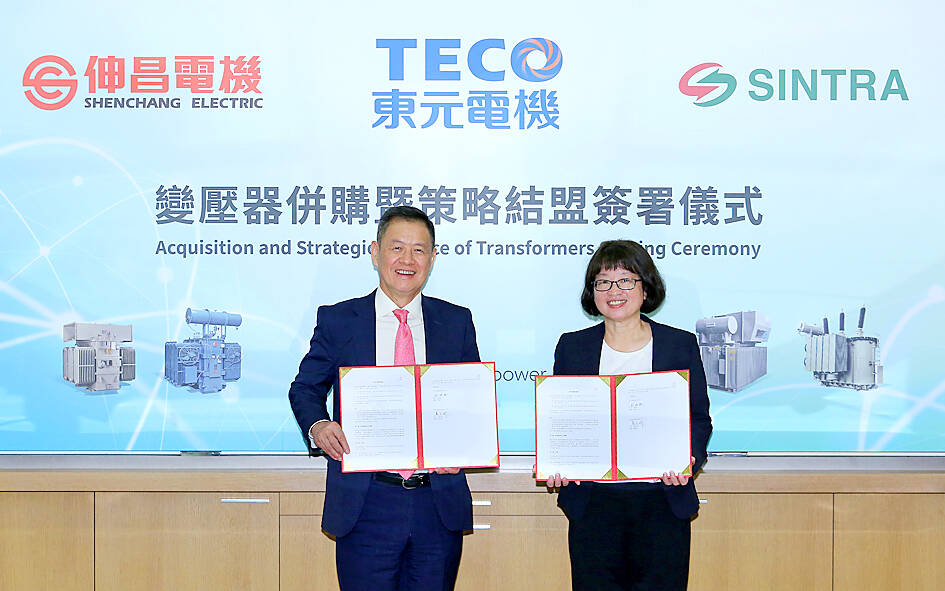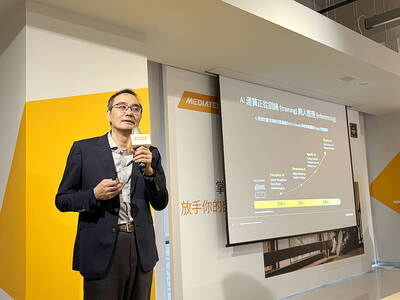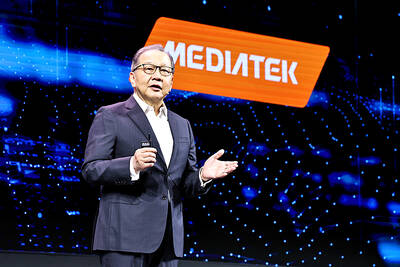Teco Electric & Machinery Co (東元電機), one of Taiwan’s leading suppliers of electric motors, yesterday announced plans to acquire local transformer maker Shenchang Electric Co (伸昌電機) for not more than NT$550 million (US$17.21 million).
The deal — which also includes forming a strategic alliance with Shenchang’s Indonesian affiliate PT Sintra Sinarindo Elektrik — is expected to begin contributing revenue to Teco Electric next quarter, the company said in a statement.
The deal comes as Teco aims to pursue global transformer business, especially in North America, and grab electromechanical business opportunities in Indonesia.

Photo courtesy of Teco Electric & Machinery Co
At a media gathering last month, Teco chairman Morris Li (利明献) unveiled the company’s three-year development plan that focuses on high-potential businesses, including green energy, power conservation, carbon reduction and electrification, as the company targets becoming a comprehensive solution provider.
In yesterday’s statement, Li said that the deal would help improve the company’s electrification product portfolio and achieve its goal of becoming an “industrial electrification integrator.”
Established in 1971, Shenchang primarily produces distribution transformers and has been active in the Indonesian market since 1996, serving companies such as Taiwan Power Co (Taipower, 台電), Formosa Plastics Group (台塑集團), PT PLN (Persero) and Siemens AG, Teco said.
Under the terms of the deal, Teco plans to acquire a 57.2 percent stake in Shenchang to become a majority shareholder and help expand Shenchang’s manufacturing facilities in Taiwan, it said.
The companies are also eying the transformer markets in Taiwan and North America, and plan to broaden their product portfolio to 69 kilovolt (kV) to 161kV power transformers in the near term, Teco added.
Moreover, the companies aim to provide green solutions amid the growing trend of climate awareness, rising demand for data centers and significant infrastructure upgrades in the US, Teco said.
The initial focus would be on meeting the enormous demand for distribution transformers in North America; in Taiwan, particularly in the industrial sector; for new energy projects and data centers; and for Taipower projects that aim to enhance the state utility’s power grid and operational resilience, it said.

MediaTek Inc (聯發科), the world’s biggest smartphone chip supplier, yesterday said it plans to double investment in data center-related technologies, including advanced packaging and high-speed interconnect technologies, to broaden the new business’ customer and service portfolios. The chip designer is redirecting its resources to data centers, mainly designing application-specific integrated circuits (ASIC) with artificial intelligence (AI) capabilities for cloud service providers. The data center business is forecast to lead growth in the next three years and become the company’s second-biggest revenue source, replacing chips used in smart devices, MediaTek president Joe Chen (陳冠州) told a media event in Taipei. “Three or four years

CHIP HANG-UP: Surging memorychip prices would deal a blow to smartphone sales this year, potentially hindering one of MediaTek’s biggest sources of revenue MediaTek Inc (聯發科), the world’s biggest smartphone chip designer, yesterday said its new artificial intelligence (AI) chips used in data centers are to account for 20 percent of its total revenue next year, as cloud service providers race to deploy AI infrastructure to meet voracious demand. MediaTek is believed to be developing tensor processing units for Google, which are used in AI applications. While it did not confirm such reports, MediaTek said its new application-specific IC (ASIC) business would be a new growth engine for the company. It again hiked its forecast for the addressable ASIC market to US$70 billion by 2028, compared

Until US President Donald Trump’s return a year ago, when the EU talked about cutting economic dependency on foreign powers — it was understood to mean China, but now Brussels has US tech in its sights. As Trump ramps up his threats — from strong-arming Europe on trade to pushing to seize Greenland — concern has grown that the unpredictable leader could, should he so wish, plunge the bloc into digital darkness. Since Trump’s Greenland climbdown, top officials have stepped up warnings that the EU is dangerously exposed to geopolitical shocks and must work toward strategic independence — in defense, energy and

Motorists ride past a mural along a street in Varanasi, India, yesterday.